The Department of Health (DOH) regional office here has alerted the public on the potential health risks and hazards that will go with the traditional week-long Lenten activities.
The DOH has issued the reminder as people converge during religious gatherings, reunions and international travel activities as the country imposes less stringent pandemic public safety protocols.
“Apart from the recognition that Covid-19 (coronavirus disease 2019) transmission is still highly probable, local traditions such as church masses, processions, passion plays, palm fronds, Easter vigils, and other local customs also present increased risks in the transmission of various infectious and communicable diseases,” the health department said in its advisory Sunday.
The DOH in Eastern Visayas reported that as of March 27, 2023, the region’s total number of Covid-19 cases was 64,728, including 64,034 recoveries and 694 deaths.
The field office urged the public to continue observing the minimum public health standards when participating in this year’s Lenten activities, especially when among crowds and enclosed spaces.
Among the minimum recommendations of the DOH regional office are to prepare early for the season to avoid stress, wear face masks when in crowded or enclosed spaces, regularly wash or sanitize hands, practice safe physical distancing and ensure good ventilation by opening doors and windows during church masses.
The public is also advised to refrain from touching and kissing the figures and statues due to the risk of transmission of communicable diseases; observe the necessary precautions and safety measures during Lent activities, such as voluntary penance during passion plays, to avoid injuries and accidents; drink plenty of water to prevent dehydration when traveling, attending processions and other Holy Week activities; and avoid prolonged exposure to extreme heat to prevent the risk of heat stroke. (PNA)




















